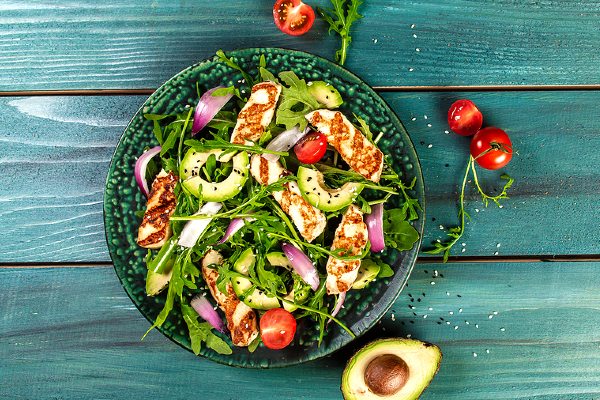Eat this…don’t eat that! It can be confusing to navigate all diets. The internet is full of tips on what you should and shouldn’t eat to lose weight, be healthier, and live longer. Choosing the right diet for you is like basketball teams competing for the playoffs. Some diets are slam dunks, while others fall flat. Follow along as we explore some of the most popular diets to see which ones make it to the championship.
The DASH diet
DASH stands for the Dietary Approaches to Stop Hypertension. The DASH diet is intended to lower or control high blood pressure by encouraging foods that are low in sodium and rich in certain helpful nutrients, like potassium. Read more about how sodium and potassium affect blood pressure here.
Pros: The DASH diet includes fruits and vegetables, fish, low-fat dairy, whole grains, poultry, and nuts. There are limited portions of less healthy items such as red meat and sweets.
Cons: None! The American Heart Association suggests this diet as a heart-healthy diet that is easy to follow, has plenty of variety and is proven to help manage blood pressure. [1] Talk about a slam dunk.
Score: Championship bound!
The Mediterranean diet

The Mediterranean diet includes healthy eating traditions from the countries near the Mediterranean Sea. This diet is also promoted as a heart-healthy diet.
Pros: The Mediterranean diet includes eating mainly plant-based foods such as fruits, vegetables, nuts, and whole grains while limiting unhealthy fats. Enjoying meals with family and friends and getting enough exercise is also a part of the diet.
Cons: While the Mediterranean diet does include moderate consumption of red wine, this is an optional addition to the diet and is not necessary. Nonetheless, research shows that following the Mediterranean diet is associated with a lower risk for many diseases and a lower overall mortality rate. [2]
Score: Another winner that is championship bound!
The Paleo diet

The Paleo diet blames processed and high carbohydrate foods for many health issues. The diet suggests that people should go back to eating what our ancestors were eating when they were cavemen and women– animal protein and plants. Paleo dieters eat meat, fish, poultry, fruits, and vegetables.
Pros: The diet encourages people to eat less processed food and less refined carbohydrates like white bread, sweet desserts made with white flour, and white rice.
Cons: Unfortunately, the diet also says that cavemen and women didn’t eat dairy or whole grains. Cutting these foods out can limit the amount of fiber, vitamins, and minerals in a diet. Focusing so much on meat also leaves less room for plant-based options, like beans, that provide important nutrition.
Score: Will not make it to the championship
The Weight Watchers diet
In Weight Watchers, you are allowed a certain number of points per day to “spend” on food. Healthy items are “cheaper” than junk food items. Some food items are “free” and don’t require any points, including beans, eggs, and fish. The Weight Watchers program also includes a physical activity component.
Pros: Weight Watchers is framed as a lifestyle change, not just a fad diet. Because you can spend your points on how you like, this program is also flexible for meeting the dietary needs of vegetarians.
Cons: To join Weight Watchers, you have to pay for one of their plans (either online-only, online with meetings, or online with one-on-one coaching). This is an added expense on top of the price of food.
Score: Will not make it to the championship
The Whole 30 diet
The Whole 30 diet says that certain foods may be causing you to be extra tired, have pains, or have skin issues without you realizing it. By not eating these foods for a month, the diet claims that you clean out your system and stop any bad symptoms related to the foods. After 30 days, you then slowly start eating the foods you cut out one food group at a time to identify which foods (if any) were causing you problems.
Pros: The diet eliminates alcohol and processed food, which can be high in sugar and salt.
Cons: It also cuts out nutritious foods like beans, dairy, and grains.
Score: Will not make it to the championship
The Ketogenic diet
The Ketogenic diet is a low carbohydrate, high-fat diet. By reducing your carbohydrates to a very low level, you will go into a state called “ketosis” where fat becomes the main fuel source for your body. The diet claims to help people lose weight.
Pros: This diet, under medical supervision, help childrens with epilepsy reduce the number or severity of seizures. [3]
Cons: There is always a red flag when you severely limit or cut out an entire macronutrient source, such as carbohydrates. If you don’t replace what you cut out with another food source that provides the same nutrition, you could become deficient in certain nutrients. A strict diet like this is also difficult to follow long-term and for those with kidney disease, this diet could worsen their condition.
Score: Will not make it to the championship
Which diet will win the championship?
It’s a tie! The DASH diet and the Mediterranean diet are both great heart-healthy diets that are associated with health benefits like lower blood pressure. With heart disease, the number one killer in America, these heart-healthy eating patterns are more important than ever to follow.
An important note: Culture and history play an important role in food. If you don’t recognize the foods that you eat or the foods that are common in your culture in either the DASH or the Mediterranean diet, that does not mean that your cultural foods are not healthful. Your culture’s foods can be a part of a healthful diet. Think:
- What foods do I eat that make my body feel good?
- What foods are nourishing?
- What fruits and vegetables do I enjoy?
It’s best if healthful diets–whatever they look like– are embraced as lifestyle changes rather than temporary changes. Lifelong healthy eating, rather than short term dieting, will provide the most benefit for your health.
Written by Taylor Newman, Ph.D. Candidate | Edited by Laurel Sanville, MS, RDN, LD


